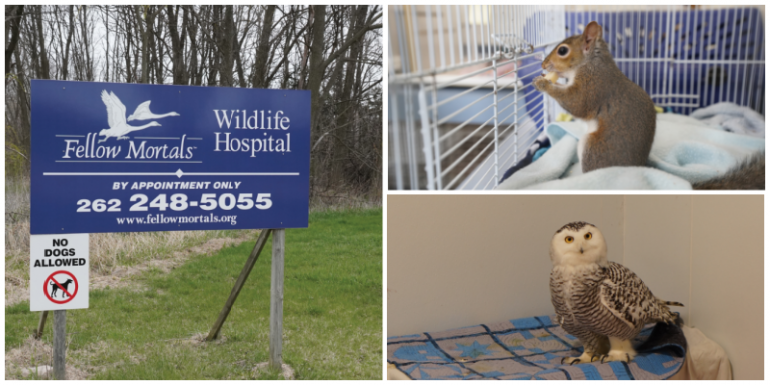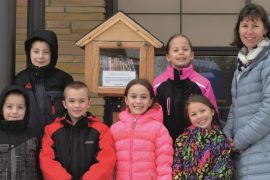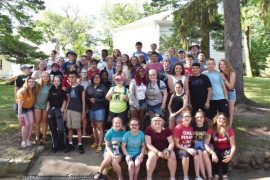By Rachel Wisinski | Photos by Holly Leitner
Yvonne Wallace Blaine can pinpoint the exact moment her life changed course. While pursuing her dream to attend law school, Yvonne and her husband Steven Blaine co-managed a mobile home park near Delavan. One day, they accidentally mowed over a nest of rabbits. Frantically, they searched for help, but they soon realized that wildlife rehabilitation centers didn’t really exist in the area. Ultimately, the couple was told to “let nature take its course.”
“I hate that saying,” Yvonne says. “It’s not natural to mow over a nest. So we took care of them.” From there, the pair began caring for more injured wild animals, until they received a visit from the county humane society and were told they needed a license to continue.
“We saw there was a need, and we saw a lot of people like us,” Yvonne says. “So I quit my job in 1991, and we decided we were going to do this full time.”
She and Steven built an animal hospital and founded Fellow Mortals, a 501(c)(3) nonprofit wildlife rescue and rehabilitation center in Elkhorn that serves southeastern Wisconsin and northern Illinois. Fellow Mortals began in the young couple’s home until the space became practically unlivable. After the mobile home park was sold, they decided to look for a larger property in the area, ultimately settling on land on Palmer Road between Williams Bay and Elkhorn. The old house on the property was burned out after a fire, and Steven spent about six months making it habitable.
Then, Yvonne and Steven bought a trailer, so the animals had their own space. In the winter of 1991, they encountered their first challenge as a young organization when they began caring for geese with lead poisoning. They worked with the Fish and Wildlife Service, Wisconsin Department of Natural Resources and local conservation groups to collect evidence for an investigation that led to the removal of 28,000 tons of harmful soil and sediment on property outside of Lake Geneva that had once belonged to the Playboy Club-Hotel.
Around the same time, Fellow Mortals began seeking donations to support its operations. People in the community united to support them and business surged, going from a capacity of caring for 100 animals per year to more than 600. Next, Fellow Mortals took on its first intern, which made Yvonne realize the benefits of having more hands. The nonprofit started an internship program, which eventually grew into a full-time staff of wildlife rehabilitators.
With 15,000 square feet under one roof, comprising a hospital, quarantine space and X-ray rooms, Fellow Mortals now helps about 2,000 animals annually and has rehabilitated over 60,000 since its inception. The property also features pool habitats,a water fowl flight area and two eagle flights, each over 100 feet long. “We feel very, very blessed that we’ve been able to do the best we can for the animals, and it’s because of community support,” Yvonne says.
HANDLING THE DEMANDS
Animal rehabilitation is unique because it goes beyond volunteerism, according to Yvonne. With rehabilitation, centers that use volunteers may have up to 20 people assigned to the care and feeding of a single animal. This makes it difficult to follow the animal’s progress and creates a more stressful environment for everyone, Yvonne says. For this reason, Fellow Mortals provides one-on-one, round- the-clock care to sick and injured animals in its care. Rehabilitators work 14-hour days, five days a week, beginning around 7:30 a.m. and finishing after 10 p.m. “You really have to have an appreciation for wildlife and make it your career,” Yvonne says.
The rehabilitation process begins with a phone call, during which Yvonne or other staffers ask numerous questions to ensure an animal requires help and makes a good candidate for Fellow Mortals’ services. Yvonne says people often think a young animal is distressed because the mother won’t return, but that’s not true. If an animal isn’t injured, a process called re-nesting or reuniting takes place. Above all, the nonprofit aims to keep healthy animals with their parents.
Generally, Fellow Mortals is able to help any species of wild bird and most non-predatory wild mammals. Fellow Mortals has cared for egrets, herons, cormorants, ducks, geese, squirrels, woodchucks, opossums, deer and more. It’s the only place in the state of Wisconsin that works with beavers, according to Yvonne. Notably, the DNR restricts Fellow Mortals from working with skunks, bats, mink or badgers, and the nonprofit has never worked with raccoons, fox, coyotes, reptiles or amphibians. Of all the calls for help that Fellow Mortals responds to, about half are situations where an animal is brought to their care by a concerned citizen. The center had a 73% survival rate in 2021. Fellow Mortals helps the most animals in the spring and summer, with October through March being classified as “quieter” months, Yvonne says. Not all animals that Fellow Mortals cares for are released back into the wild, but most are.
Yvonne and her staff work hard to educate the public about rehabilitation, which she says is not well understood and is comparable to calling the doctor. “You’re not going to set an arm yourself or tube feed a person,” she says. “We’re trying to get that information out to people because it means the animal they find has a better chance at survival.”
Taking that effort one step further, the children’s program “Into the Outdoors” on PBS featured an episode on Fellow Mortals as a means of educating people about what to do if they find an injured animal.
ANIMALS AND GLOBAL HEALTH
As Fellow Mortals continues to evolve, Yvonne says the job has become more complicated due to emerging diseases. The nonprofit first encountered West Nile virus in birds in 2000, which she says changed a lot of things because it was unknown how the virus was transferred. “We really had to think about biosecurity for the first time,” she says. In 2003, chronic wasting disease was discovered in Walworth County, putting the rehabilitation of deer on pause. Within the past couple of years, SARS- CoV-2 was discovered in white tail deer. A significant avian flu outbreak in the spring further complicated the landscape.
Now, Fellow Mortals must think about how it can help animals despite the unknowns, according to Yvonne. If the nonprofit takes in an infected bird, a virus could spread and kill all birds under its care. Therefore, Fellow Mortals is working with epidemiologists to find a solution. “We’ve got a really complicated landscape in rehabilitation in 2022, and we’re still trying to figure out if we’ll be able to work with deer or birds,” she says.
CELEBRATING REHABILITATION SUCCESSES AT FELLOW MORTALS
Despite all the trials, Yvonne is also able to revel in their success stories. Last year, Fellow Mortals cared for an eagle that had contracted lead poisoning, releasing it back into the wild after rehabilitation. The raptor had been sitting quiet and depressed on a woman’s porch. Yvonne says Fellow Mortals treated the bird for several weeks before he was transferred to one of the eagle flights to test whether a release was feasible. About two months after being brought in, the eagle was released at Big Foot Country Club
in Fontana.
During an average year, Fellow Mortals sees plenty of rabbits, squirrels and water fowl. Raptors are less common, while gray herons and egrets are rare. In 1996, the center helped rehabilitate the first pelican in the state of Wisconsin. “You never know exactly what the year is going to look like,” Yvonne says.
Recently, a Fellow Mortals staffer responded to a snowy owl in distress. The bird had two broken wings and a broken leg and was trying to remove itself from the road on its good leg, according to Yvonne. She says the owl, believed to be female, probably won’t be released back into the wild, but if it can adapt to captivity, the center will keep it for educational purposes. “She’s a stinker. She has an attitude,” Yvonne says. “She is hopping up and can get around a little. But the fact that she has an attitude, that’s great. That’s what a bird needs to handle captivity.”
FIGHTING FOR THE FUTURE
From their earliest days founding Fellow Mortals, Yvonne and her husband Steven have worked to improve the world of wildlife rehabilitation. Yvonne served as president of the Wisconsin Wildlife Rehabilitators Association and sat on the advisory board of the now- defunct Illinois Wildlife Rehabilitators Association. While she was at the helm, the state of Wisconsin adopted the Captive Wildlife Safety Act in 2004, making rehabilitation a legal activity. Yvonne also served as chair of the Wildlife Rehabilitation Advisory Council to the Wisconsin DNR from 2013 to 2019. She and Steven have learned that rehabilitation requires training, and training requires qualified people to learn from.
Despite working about 70 hours a week, Yvonne is happy with her decision to skip law school. She says having another attorney in the world wouldn’t have made a difference, but Fellow Mortals allows her to advocate for animals and give them a second chance at life. “I wake up excited every day about what’s going to happen, and I think the fact that I’m not bored ever — how many people can say they still have that feeling after doing it as long as I have?” Yvonne says.
Looking forward, she and Steven plan to expand the Fellow Mortals facility, and they are seeking contributions for this effort through Team Hope, an initiative through which donors make a monthly financial commitment. Above all, Yvonne wants people to be more compassionate toward nonhuman beings. She encourages everyone to be more mindful, thinking about the fact that animals have families and “deserve to live among us.”
“We all share this space, and it’s getting harder and harder as we make things more convenient for humans,” she says.
WHAT TO DO IF YOU FIND AN INJURED ANIMAL
It’s important to know whether it’s a species that Fellow Mortals can help. If it is, or if you’re unsure, follow these steps:
- Call Fellow Mortals at 262-248-5055 and leave a message. Director Yvonne Wallace Blaine says you’ll always get a recording, but staff checks the messages every 30 minutes or so.
- Cover the animal with a laundry basket or similar object so it can’t get away. Weigh down the basket so nothing else can get in.
- Be patient and don’t panic. Fellow Mortals will call. Wallace Blaine says it’s extremely important people don’t drop in without an appointment.
- Don’t try to feed the animal! Wild animals fed prior to arriving at the center tend to have worse outcomes, Wallace Blaine says.
- Fellow Mortals will ask several questions to determine where the animal was found and what condition it’s in. Answer these questions to the best of your ability, giving all possible details.
- If the animal is a good candidate for rehabilitation, you’ll be asked to transport the animal to the center.
If you find a species Fellow Mortals cannot assist with, call the DNR tip line for information about another rehabilitator or find a list of rehabilitators at dnr.wisconsin.gov/topic/wildlifehabitat/orphan.





